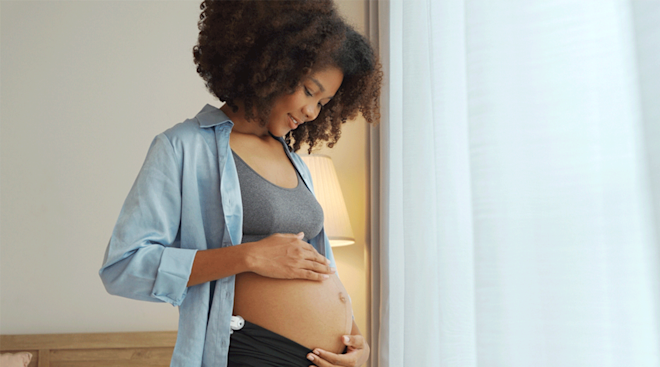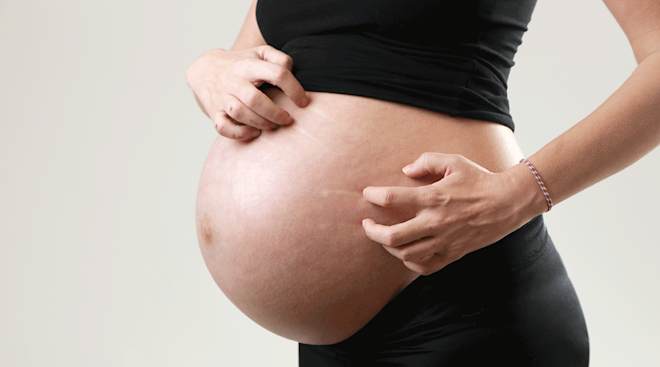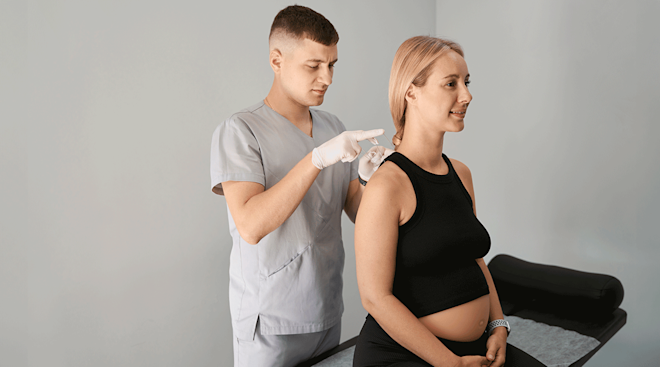
What Is a Normal Pregnancy Temperature?
By now, most experts agree that not everyone has a normal body temperature of 98.6. Some people tend to run a little warmer when they’re healthy; others tend to be a little cooler. If you have a good idea of your normal baseline temperature, it’s important to know this: It’s usually a little higher in pregnancy. There are a few factors that go into this temperature increase, but it can and does happen. Here’s what you need to know about a normal pregnancy temperature, plus what it means for you.
Your normal body temperature may rise during pregnancy, but it’s unlikely to be a huge increase, says Christine Greves, MD, an ob-gyn at the Winnie Palmer Hospital for Women & Babies in Orlando, Florida. So what is a normal body temperature for a pregnant woman? “It could rise about 0.2 degrees Fahrenheit,” she says. For example, if your baseline body temperature pre-pregnancy was 98.2, your body temperature when pregnant could be 98.4. “It’s super, super subtle,” says G. Thomas Ruiz, MD, lead ob-gyn at MemorialCare Orange Coast Medical Center in Fountain Valley, California.
So why is your pregnancy temperature different than your pre-pregnancy body temp? It rises slightly when you’re expecting due to the increase in your body’s blood volume to meet the demands of your growing baby, explains women’s health expert Jennifer Wider, MD. “Due to this increase and the increases in body metabolism, the core temperature rises,” she says.
Your early pregnancy temperature range starts out higher, particularly in the first trimester, Greves says, and then falls as your pregnancy progresses. In fact, if you were using your basal body temperature to track your ovulation, you may have noticed that it rose slightly (and stayed elevated) after you conceived, Wider says. While your body temperature when pregnant is highest in the first trimester, keep in mind that your core temperature will increase more easily later in your pregnancy when you exercise or are out and about in hot weather, Wider says.
If your normal body temperature hasn’t risen during pregnancy, don’t panic. Your core body temperature has a range, Wider says, making it hard to get an exact read on what your new body temp is. Given that it goes up only slightly during pregnancy, it’s also difficult to determine an exact number for your new pregnancy temperature. Either way, it’s not a cause for concern if that number on the thermometer doesn’t rise. “The change in temperature really isn’t significant,” Ruiz says.
Illness and fevers happen, but do your best to avoid developing a fever or letting one persist during pregnancy. That’s because if your internal temperature gets too high, especially in your first trimester, it can potentially increase the risk of miscarriage, neural tube defects (aka birth defects of the brain, spine or spinal cord) and developmental problems, including cleft lip and palate and congenital heart defects, according to the doctors we spoke with.
In general, you want to do what you can to avoid raising your body temperature when pregnant, Greves says. That includes avoiding the use of a hot tub or sauna, taking a piping hot bath (where the water is hotter than 100 degrees) or being outside for too long on very hot days. However, you can use a heating pad on localized areas, like your back, legs or feet. “It shouldn’t increase your core body temperature,” Greves says. Just don’t use it for more than 15 minutes, and make sure the pad is below 100 degrees Fahrenheit.
Because the increase in pregnancy temperature is so low, doctors still consider the standard marker of a fever—100.4 degrees or above—as a fever during pregnancy, Ruiz says.
If you have a mild fever, you can take acetaminophen (Tylenol) to try to bring it down, Ruiz says. Drinking a lot of fluids can help too, he says. It’s important to let your doctor know what’s going on, even if your fever is low. “We want to know other symptoms,” Greves says. “If you have a stiff neck and rash, I would address that immediately, as opposed to someone having a few sniffles and a mild fever.” Call your doctor immediately if you have a fever of 102 or higher, which would require additional attention.
About the experts:
Christine Greves, MD, FACOG, is an ob-gyn at the Orlando Health Winnie Palmer Hospital for Women & Babies in Orlando, Florida. She received her medical degree from the University of South Florida College of Medicine.
G. Thomas Ruiz, MD, is the lead ob-gyn at MemorialCare Orange Coast Medical Center in Fountain Valley, California. He earned his medical degree from UC Irvine School of Medicine and has been practicing medicine in Orange County since 1993.
Jennifer Wider, MD, is a New York City-based women’s health expert and author. She received her medical degree from the Mount Sinai School of Medicine.
Please note: The Bump and the materials and information it contains are not intended to, and do not constitute, medical or other health advice or diagnosis and should not be used as such. You should always consult with a qualified physician or health professional about your specific circumstances.
Plus, more from The Bump:
Navigate forward to interact with the calendar and select a date. Press the question mark key to get the keyboard shortcuts for changing dates.



















































